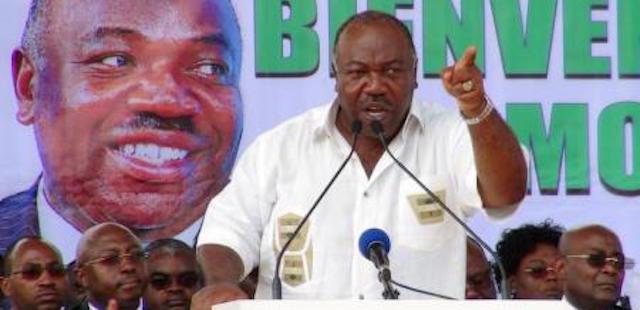Gabon parliament set on fire after Bongo declared re-elected
September 1, 2016

Demonstrators in Gabon clashed with police and set part of the parliament building on fire on Wednesday amid anger among opposition supporters over President Ali Bongo’s re-election in polls that his main rival, Jean Ping, claimed to have won.
Opposition members of the Central African oil producer’s electoral commission rejected Saturday’s first-past-the-post election result, which would see the Bongo family’s nearly half-century in power extended another seven years.
France, the United States, and the European Union all urged calm on Wednesday and called upon Gabonese authorities to release the results of individual polling stations for greater transparency.
Bongo won 49.80% of votes, compared to 48.23% for Ping, with a turnout of 59.46 percent, according to results announced region by region by Interior Minister Pacome Moubelet Boubeya.
“This victory by such a tight score obliges … each of us to respect the verdict of the ballot box and our institutions,” Bongo said in the text of a victory speech distributed to reporters. “Our country is advancing and that advance must take place with the unity and peace so dear to the Gabonese people.”
Soon after the result was announced on state-owned television, riot police fired teargas in clashes with around 100 opposition supporters in one neighbourhood in the capital Libreville. Police and soldiers, meanwhile, were stationed at most crossroads and petrol stations.
Protesters entered the grounds of Gabon’s parliament building, the National Assembly, late in the afternoon. “The demonstrators entering from the back and set fire to the National Assembly … Part of the building is on fire,” said a witness, who asked not to be named out of fear of reprisal.
Firemen arrived and were attempting to put out the blaze, he said. But as night fell over the capital the flames remained visible from a distance.
Several Libreville residents said social media, including Facebook and Twitter, were no longer functioning.
Gabon’s main cities had been on edge since Tuesday, with residents stockpiling food ahead of the expected announcement, which was later postponed by one day.
“We tell the people of Gabon not to let their victory be stolen from them. Ali Bongo does not own this country,” said Paul Marie Gondjout, a member of the electoral commission from Ping’s party.
Commission members belonging to the opposition abstained from a vote that validated the election result. Ping’s party said its tally showed their candidate won 59 percent of the vote versus 38 percent for Bongo, with only one province left to count – a claim the government condemned as an effort to destabilise the country.
Ali Bongo was first elected in 2009 after the death of his father, Omar Bongo, who ran Gabon for 42 years. He benefited from being the incumbent in a country with a patronage system lubricated by oil largesse.
Though voting on Saturday was generally peaceful, Bongo and Ping’s supporters traded accusations of fraud.
An EU observer mission sent to monitor the polls criticised a “lack of transparency” among the institutions running the election and said Bongo had benefited from preferential access to money and the media.
Former colonial ruler France’s foreign ministry said the manner in which the final results were announced on Wednesday was a source of concern. “We think it is necessary to publish the results of all the polling stations. The credibility of the election as well as Gabon’s international reputation are at stake,” it said.
The statement was echoed by the US Department of State, which urged all sides to “temper their rhetoric and encourage their supporters to remain calm”. It also called upon Gabon’s security forces to exercise restraint.
The election followed a bitter campaign. Gabon’s economic troubles, caused by falling oil output and prices, have led to budget cuts in one of Africa’s richest nations and fuelled opposition charges that its 1.8 million people have struggled under Bongo’s leadership.
Ping, a life-long political insider who has served as foreign minister and African Union Commission chairman, was a close ally of Omar Bongo and even fathered two children with the late president’s daughter, Pascaline.


